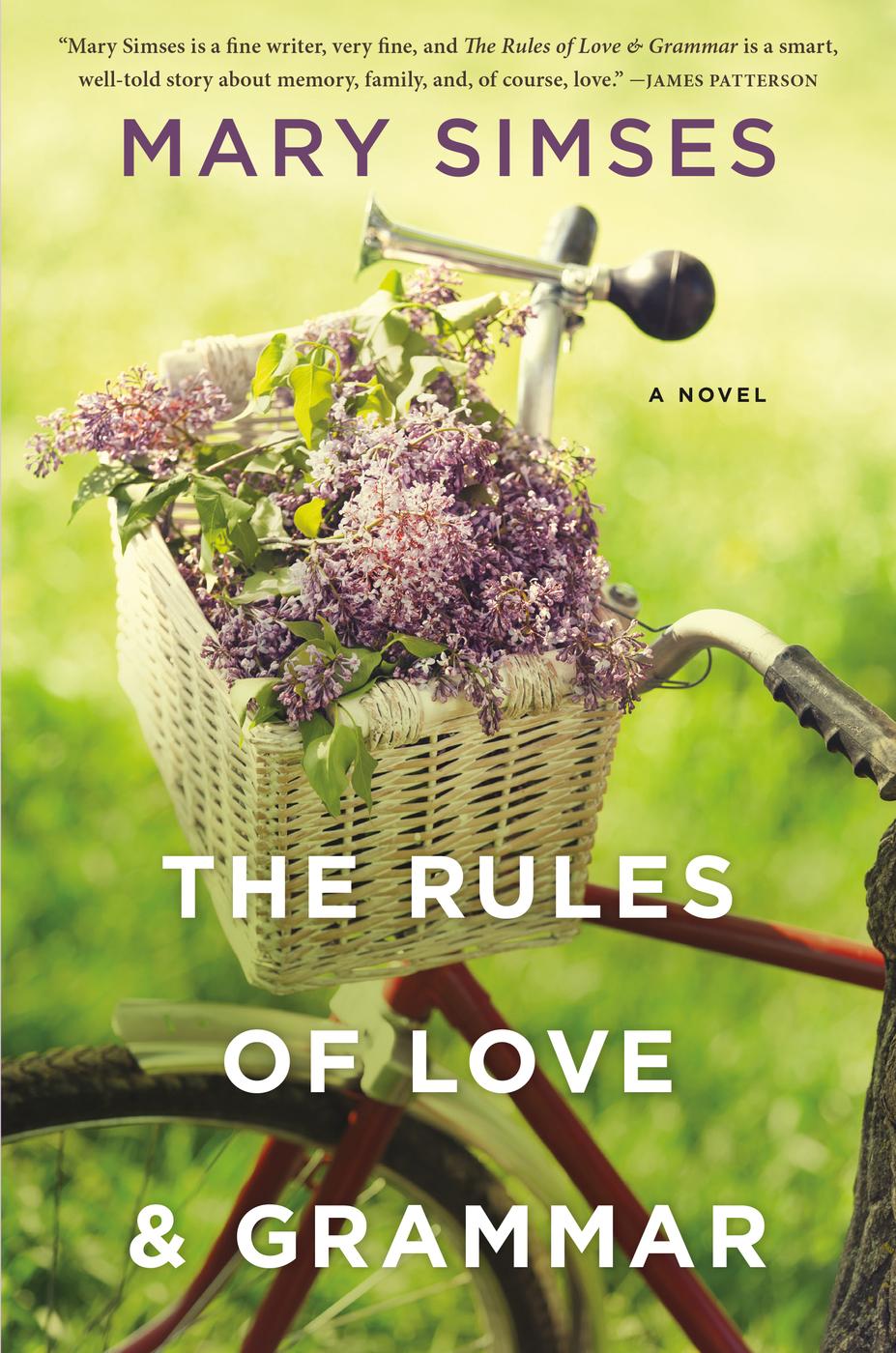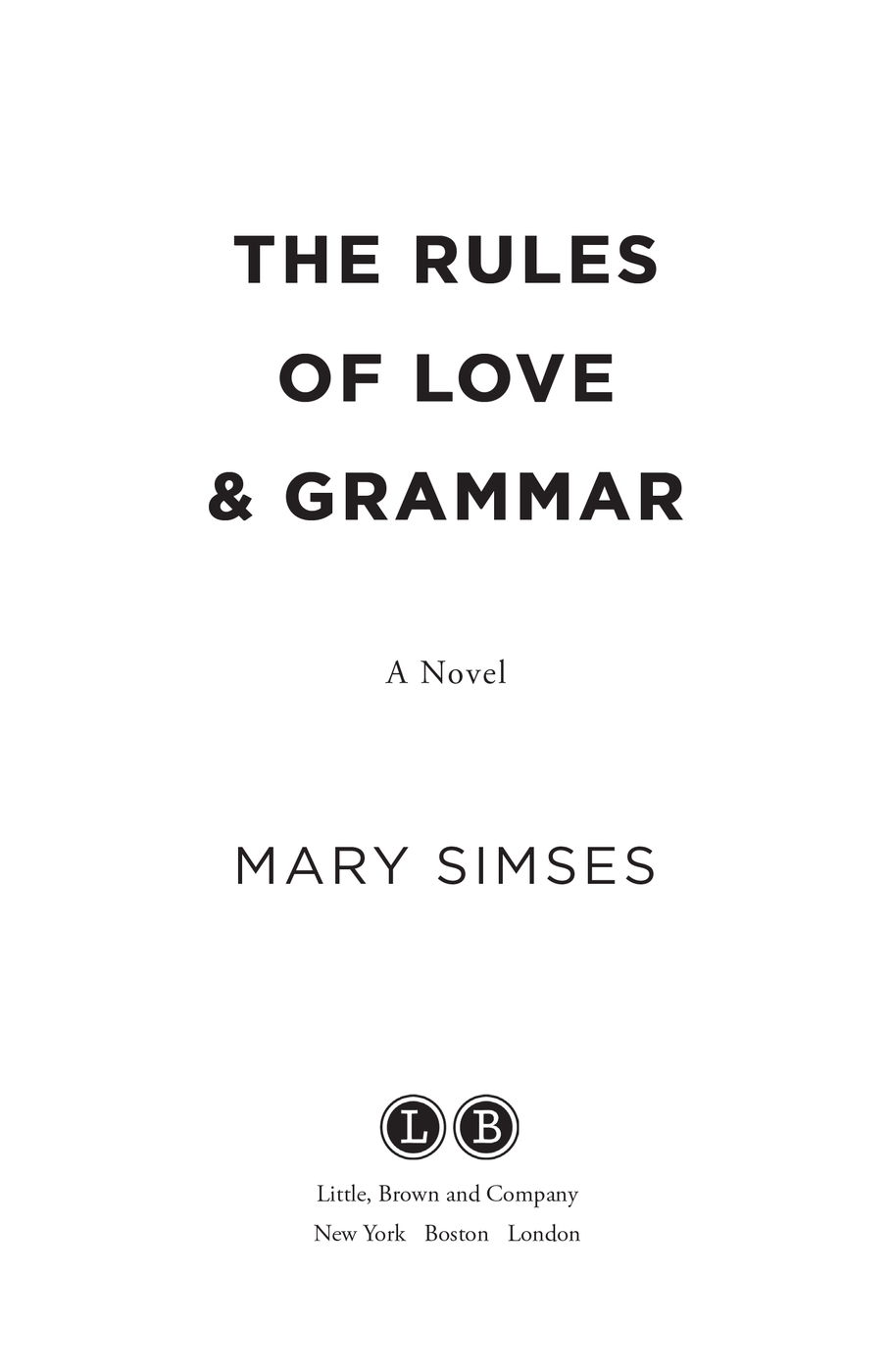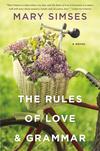The Rules of Love & Grammar
Read The Rules of Love & Grammar Online
Authors: Mary Simses




Hachette Book Group supports the right to free expression and the value of copyright. The purpose of copyright is to encourage writers and artists to produce the creative works that enrich our culture.
The scanning, uploading, and distribution of this book without permission is a theft of the author's intellectual property. If you would like permission to use material from the book (other than for review purposes), please contact [email protected]. Thank you for your support of the author's rights.
To Rebecca Tucker Holliman,
my childhood friend and fellow detective
(or were we spies?)
Â
and
Â
John Frederick Sutton,
my ninth-grade English teacher,
who encouraged my love of words
I mean, don't forget the Earth's
about five thousand million years old, at least.
Who can afford to live in the past?
âHarold Pinter
A noun is a person, place, or thing.
Bad
luck
comes in threes.
T
he sound of hammering on the roof wakes me, and for a moment I don't remember where I am. I glance at the white coverlet, the pink rosebuds on the wallpaper, the jar of sea glass on the dresser, and I remember I'm not in my apartment in Manhattan. I'm in my old room, in Dorset, Connecticut, in the house where I grew up, in a bed with a mattress that feels much too hard.
It's Thursday, and if it were a normal Thursday, I'd be getting up and going to work. But my job of four years is gone, eliminated in last Friday's corporate reorganization. If it were a normal Thursday, I'd be looking forward to spending the weekend with Scott, maybe in the Hamptons. But Scott's gone, too. He's fallen out of love with me and in love with a paralegal in his officeâanother reorganization. I should be back in my apartment, grieving over my losses, licking my wounds, but I can't even do that. Yesterday, a chunk of my ceiling collapsed from a water leak and I had to evacuate, probably for three weeks. So, here I amâjobless, homeless, and single. All I want to do is sleep through the rest of my life. And somebody is banging on the roof.
I head down the back stairs and into the kitchen, where the copper pots hang over the island like a constellation and my mother's collection of blue and white Staffordshire china gleams in the corner cabinet. Through the bank of windows, I see the long stretch of lawn that slopes gently toward the rocks and sedges. The waters of Long Island Sound flash and sparkle in the sun, and a salty breeze sings through the window screens. A lone kayaker skims by, his oar dipping in and out of the water.
“Anybody home?”
The house is empty.
I look at the wooden countertop, at the usual clutter of papers and magazines and unopened mail. Leaning against the toaster is a note from Mom, written in her wide, slanted architect's lettering.Â
GRACE, GONE TO DEAL WITH THE FLOWERS AND THE CAKE. SEE YOU AFTER WORK
.
The flowers and cake are for my father's sixty-fifth birthday party, which takes place here in two weeks and to which my mother has invited a hundred and thirty people.
The hammering continues, driving me down the hall, toward the front door, the old pine floorboards creaking under my feet. A small pile of books rests on the bottom of the staircase banister, where the mahogany ends in a swirl. Wallace Stevens, W. H. Auden, e. e. cummings, Anne Sexton. Dad must be teaching his modern poetry master class this summer.
Each year he swears it's going to be his last year teaching, but then he lets the university talk him into doing it
one more time.
I don't think they'll ever really let him go. It was even a huge deal five years ago when he said he wanted to step down as head of the English Department, give up his administrative responsibilities, and return to just being a professor. From their shocked reactions, you'd think he'd told them he was going to open a strip club.
Outside, the June morning is warm. The dew on the grass dampens the soles of my feet as I step onto the lawn. The air smells dank, like seaweed and oysters and mussels, a very New England smell.
Two men are on the roof, tool belts slung low on their hips. “Excuse me!” I yell. They peer down at me, and I realize I haven't even brushed my hair. I give a little wave.
“Hey,” the shorter man says, waving back and then scratching his beard.
I tighten the belt on my robe. “What are you doing? Putting on a new roof?”
The shorter man drops his pile of shingles. “Yeah, you got it. I'm surprised this one lasted as long as it did.”
I glance at my watch. “Do you know it's only eight twenty-five? Isn't that a little early?”
The men look at each other. “Uh, well, we always start at eight,” the taller man says, tucking in his green Down's Auto Body T-shirt where it's popped out in the back.
Maybe in a perfect world, one in which I still had my job and my boyfriend, not to mention my ceiling, this wouldn't seem so outrageous. But today it does. Today I just want to sleep.
“Sorry if we woke you up,” Auto Body says. He stares at the legs of my pajamas and grins. “What are those, anyway? Dogs?”
I look down. “No, actually, they're reindeer. And Santas.” I stuff my hands in the pockets of my robe. “I like to keep the Christmas spirit going all year.” I'm not about to explain how I ran out of my apartment with barely the clothes on my back and how I'm lucky I had these here.
“Ah,” he says. “Good idea.”
“So, is this going to take long?” I ask, wondering how many mornings my sleep will be curtailed.
The bearded man glances at the roof. “A couple of weeks, maybe longer, depending on the weather.”
I make a mental note to pick up a pair of earplugs. “I'd better leave you to your work, then.”
Back in the kitchen, I furiously sort through the mail, throwing out the junk and making piles of what's leftâinvitations, bills, magazines, and catalogs. There's something so comforting about order. The counter already looks neater, giving me a small sense of accomplishment and relief. I gather up the scraps of paperâreceipts from the dry cleaner's, stickies with phone numbers on them, and an envelope on which my father has scrawled a line, probably part of a poem.
She leaves them in her wake
.
I turn to a little stack of photographs. The picture on top is of an old barn, its wood weathered to a soft chestnut. Another photo shows the interior, where a ladder leads to a second-floor loft. There's a drawing of the barn next to the photosâa little rendering Mom has done. Someone must have hired her to refurbish the space into an artist's studio. She's added a number of windows, allowing light to stream in and illuminate a whimsical figure she's drawn by an easel. This little touch, so typical of Mom, makes me smile.
Most of the second floor of the barn is gone in Mom's sketch. What remains looks just the right size for a sleeping loft or a reading nook. My mother has added a window up there and has replaced the ladder with a staircase. I can't help but wonder if this little loft is really a shrine for my sister, Renny, who always loved to curl up in a cozy space with a book.
The doorbell rings, and I set my mother's drawing aside. I can see Cluny's red Jeep through the front-door side lights as I head down the hall. My best friend since our first day of school at Smithridge Elementary, she still lives in Dorset, with her husband, their two young daughters, and five adopted animalsâtwo dogs, two cats, and a canary.
“Grace!” She greets me with a big smile. A breeze ruffles the hem of her long skirt and lifts her hair, and her auburn curls float behind her willowy frame as if they have a life of their own.
I pull her into the front hall and give her a hug. “It's great to see you. I wasn't expecting you until later.”
“I know, but my meeting at the printer's got switched to this afternoon. We're running proofs on some new cards.”
Cluny has her own line of greeting cards, featuring drawings she creates with pen and ink and watercolors. She places dogs and cats and other animals in human situations, doing things like blowing out candles on a birthday cake, sailing a sloop in a race, drinking cocktails at a party, and relaxing in beach chairs by the ocean. I'm so proud of how successful she's been, with her cards in gift shops all over the country now.
“I figured while I had the time this morning, I'd see if you were up,” she says.
I lean against the Chippendale chest. “Oh, I'm up, all right. The roofers woke me. They've got nail guns that sound like AK-47s. And they'll be here for at least two weeks.”
“Don't worry,” she says, casually flicking her hand. “We've got plenty of things to do. You'll be out of the house every day.”
“But I don't want to be out of the house. I don't want to see anybody. I want to stay in and sleep.”
“What? Not when you're finally going to be here for more than a day! How many years has it been since you've had a real visit, Grace? I can't even remember.” She brushes a strand of hair away from my face and softens her voice. “The point is, you're here now, and you can't lock yourself away like some kind of depressed person.”
“But I
am
some kind of depressed person.”
“No, you're not. You're just going through a rough patch.”
“This is a lot more than a rough patch. I lose my job, and then Scott dumps me. And then my ceiling comes crashing down.” I can feel my eyes getting prickly. “I just want to hibernate.” I walk down the hall, toward the kitchen.
“Grace, you'll find another proofreading job. And you'llâ”
“It wasn't proofreading,” I say as I stop. “I was reviewing translations done by computers and correcting the mistakes. It's much more complicated than proofreading.”
She puts her hand on my arm and gives me an apologetic look. “I'm sorry. I know I always get that wrong.”
“It's okay. Everybody does.”
“Anyway, I know you'll find another job.”
I wish I could be that optimistic. I don't even know where to start. “It's hard thinking about a job when I'm so upset about Scott. How could he do this to me? We were about to celebrate our one-year anniversary. We had plans to go to Italy this fall.
Italy.
And then he tells me about Elena, the paralegal from Structured Finance.”
Cluny gives me her concerned-mother look as we walk into the kitchen. “It just means he wasn't the right guy for you, Grace.”
“I guess not.” I look away and dab my eyes. “Oh God, I just want to go back to bed.”
She sits down at the table. “No. You can't go back to bed. You can't spend your whole time here in your⦔ She waves her hand, and her eyes go to my legs. “Your Christmas pajamas.”
“I can find some other pajamas.”
She gives me an exasperated look. “That's not the point.”
I pick up the coffee carafe. A cup or two is still left. “Do you want some of this?”
“That much,” she tells me, making a narrow gap between her thumb and index finger.
I fill a mug halfway for her and another for me, and then I open the freezer and inspect the ice cream containers lined up like silos. Chocolate chip, mint chocolate chip, cookie crunch, banana swirl, strawberry cheesecake.
“Got enough ice cream in there?” Cluny begins to count the containers.
“Excuse me, but did you know that
desserts
is
stressed
spelled backward?”
“Is it really?” She moves her finger as if she's writing the letters in the air. Then she smiles. “You're right.”
I grab the cookie crunch and take a seat across from her at the table.
“All natural,”
I say, reading the words on the label and savoring the first spoonful. “You would like this.” When I turn the container around, however, I notice that someone has left out the comma between
Madison
and
Wisconsin
in the company's address. Sometimes I hate myself.
“I have something that will cheer you up,” Cluny says as I put another spoonful of ice cream in my mouth. “Are you listening to me?” Her green eyes dance.
“Yeah, I'm listening.”
“You're not going to believe whose picture is on the front page of the
Review
.
” She pulls a piece of folded newspaper from her handbag. “Guess,” she says, keeping the paper concealed with her hand.
“I'm thinking.” I scoop up another spoonful of ice cream. “Teddy McRandell?” Teddy went to Smithridge Elementary with us and was always getting into trouble. I heard he recently moved back to town. Apparently he's in real estate development and he bought the old Lawrence estate.
Cluny laughs. “No, it's not him. Try again.”
I put my spoon on the table and sit up straight. “Just tell me. I hate how you always do this.”
“Do what?” She guards the newspaper.
“Make me guess.”
“No, I don't.”
“You've done it ever since we were kids, back in our Nancy Drew days, when we wanted to be detectives. Whenever you found a clue, you'd make me guess what it was.”
“Spies.”
“What?”
“We wanted to be spies, not detectives.”
“No, I wanted to be a detective, you wanted to be a spy. Now show me what you have to show me.”
She opens the folded paper, revealing the front page of the
Dorset Review
.
“Read this.” She points to a caption underneath a photo:
FORMER RESIDENT RETURNS TO DIRECT MOVIE.
Peter Brooks, 33, director of three hit romantic comedies, including
Paris Love Letter,
has returned to Dorset after seventeen years to film scenes for a new movie. Brooks will be in town for the next two weeks.
I stare at the man in the photo, with his wavy, brown hair, blue eyes, and smile that almost jumps off the page, and my heart stops. It's Peter, all right. I pick up the paper for a closer look, and instantly I'm back in my emerald-green dress. I'm at the Dorset Yacht Club, and it's May of our sophomore year of high school, seventeen years ago. As the band plays a cover of the Shania TwainâBryan White song “From This Moment On,” Peter and I are slow dancing. His arm is around my back, his breath warm on my neck. I close my eyes and lean against his chest, and it doesn't seem real. This isn't the same Peter who has thought of me only as a friend for the past three years, while I've imagined so much more. This is a different Peter, who finally, today, has begun to look at me with new eyes. And here we are. And it's magical.
I glance up.
Cluny is smiling. “Your old high school sweetheart, a big-time Hollywood director, back in town. What do you think?”
“I think we had one incredible night, Cluny. One dance, one kiss. But it was a short romance.”